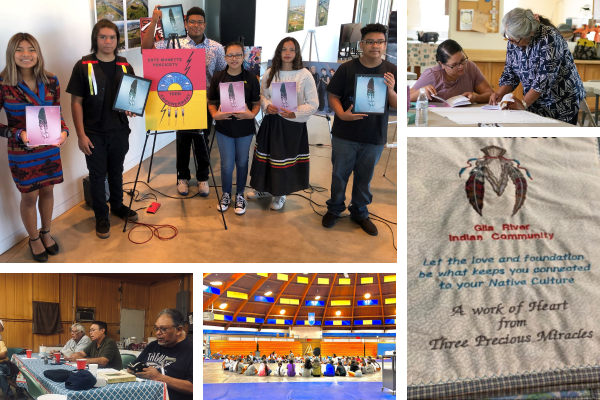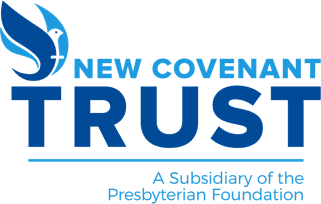
Cook Native American Ministries Foundation (CNAMF) isn’t like most other charitable foundations.
While they certainly provide funding like a typical granting organization, the investment they make in the people and communities they serve goes far beyond financial. CNAMF provides hands-on support and education to help Native communities secure a sustainable future that’s focused on faith, spirituality and well-being.
“Our mission is to empower Native people to be conduits for positive change in their communities,” says CEO and Executive Director Wendy Weston, a member of the Navajo Nation.
Founded in 1870s by Presbyterian minister Rev. Charles H. Cook, CNAMF is rooted in faith, though not affiliated with any particular religious organization.
“We are faith-based, embracing a broad interpretation. That’s because in Indian country, there are a lot of Native people who still practice our Native ways, and many of us are Christians as well,” says Weston. “And, we’re other religions, too. I know Native people who are Jewish, who practice Buddhism, and those who are part of other traditions.”
Today, CNAMF is proud to continue Rev. Cook’s legacy of equipping Native people with education and opportunities to serve as leaders in their churches, businesses, politics, and civic and social service.
Lifting Up Native Communities
While CNAMF is based in Arizona, their reach is national in scope. In 2023, the organization awarded $71,000 in grants and $21,000 in sponsorships to 14 grassroots Native churches and community organizations across the country. CNAMF also completed a successful fundraising campaign for the Charles H. Cook Legacy Fund, which earned $303,000 toward a permanent fund to support programs in tribal churches and communities.
Some of the 2023 grant recipients included American Indian Services’ STEM summer program for Native students in Arizona, Utah, South Dakota and Idaho; Three Precious Miracles’ “Miracles Paint Night” program in Sacaton, Arizona, which offers Native children in foster care and their families ways to express themselves in a safe place through art and cultural interactions; and Nez Perce Joint Session’s technology support initiative in Lapwai, Idaho, which provides remote services for bible studies, camp meetings and church services.
Sponsorships activities ranged from providing Thanksgiving baskets to Native urban families, to distributing backpacks of school supplies to Native students, to partnering with a church to present a Native art exhibition featuring 15 Arizona artists.
While these distributions of funds and resources made a big impact, it was the partnerships and relationships CNAMF built, and continues to cultivate, with each recipient that is making a true, long-lasting difference.
Building Bridges
Weston sees CNAMF’s role as the bridge between large church and funding organizations and small, rural Native church communities. She adds that the organization is a big supporter of the movement toward decolonizing wealth.
“I feel like we are an example of that because we are so hands-on, because we are so personal, and interact one-on-one with our fundees,” she says. “We have to be, because that’s how Native communities operate. It’s a long journey, and you have to build trust in those communities.”
To build that trust, the CNAMF staff spends a lot of time in Native communities, attending meetings, having one-on-one conversations, and getting to know the people.
“Many times, you go into a small tribal community and they don’t know how to get funding for the things they want to do. Many lack the tools to develop and construct a grant, so they miss out on opportunities,” says Weston.
That’s when CNAMF’s program manager will bring a grant-making workshop to that community. “It’s a very hands-on, step-by-step, one-on-one process of teaching them to obtain grant funding. We’re their champion,” says Weston.
Success Stories
One organization that CNAMF has championed is Three Precious Miracles, a 2023 grant recipient.
Founder Elisia Manual is a young woman in the Gila River Indian community who dreamed of working with Native children in the foster care system, but didn’t know how to get started a few years ago.
“With our help, she wrote a grant to CNAMF, and we funded a project where she purchased sewing machines and material, and the women in her community created quilts for Native kids in foster homes,” says Weston. Embroidered on the quilts were tribal seals and other iconography. A quilt was given to a child, but also provided education to the foster parents about that child’s cultural history.
This was the first of many projects.
Three Precious Miracles is now a thriving 501(c)3 nonprofit, and CNAMF continues to support their programs, including sock and toys drives. Manuel “is thoroughly empowered through our support,” says Weston. “We gave her that seed money, and that confidence and support, to be where she is today.”
Another success story is Generation Church in Montana. Thanks to CNAMF’s guidance, the youth groups have organized across all eight of the church’s sites, with a representative from each site serving on a larger committee. “We provide support to their efforts in terms of backpacks, supplies, conference fees, anything that they need,” Weston says.
There are many more examples like this.
CNAMF provides funding to leadership development workshops for United National Indian Tribal Youth Inc., a national youth leadership organization. It also provides funding and resources to an urban Native ministry in downtown Phoenix, which supports homeless Native youth and seniors.
“We funded a project to have an Oklahoma American Indian Presbyterian Church record their members’ family histories and build a curriculum in faith practices for the congregation,” Weston adds. “We also helped fund an afterschool diversion program at a Presbyterian church in Bridgeton, New Jersey, for a group of Nanticoke Lenni-Lenape youth who were being bullied in school and struggled with academic performance.”
The stories of ongoing impact are too many to list.
Securing a Bright Future
As for the future, CNAMF’s goal is always to reach more Native people and communities.
“I’d like to see our organization facilitate a national convening of Native missions of the major churches in America alongside cultural practitioners,” Weston says. “To have dialogue and to discuss ways we can support one another. We could be an example to our communities of what working together looks like.”
Weston adds that CNAMF would like to deepen its work with Native churches, specifically in the American Indian Presbyterian community. “We would like to focus some energy and resources on supporting those churches,” she says.
Reaching these critical goals will require more partnerships, and more resources. New Covenant Trust is grateful to be able to contribute to these efforts through faithful stewardship of CNAMF’s investments.
“New Covenant Trust holds a majority of our financial holdings,” says Weston. “They manage our funds very well, for which we are very grateful. We have a positive and strong relationship with the individuals that we work with at New Covenant Trust. We couldn’t be stable and healthy without their guidance.”
NCTC is honored to support the mission and good works of Cook Native American Ministries Foundation. To learn more about their mission and impact, watch their informational video here or visit www.cooknam.org.
